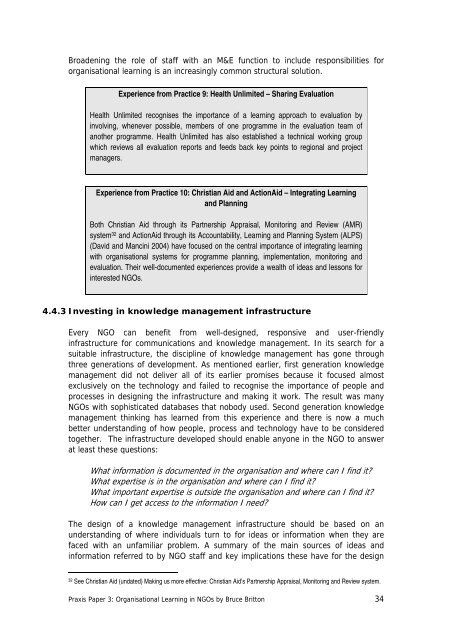Organisational Learning Discussion Paper - Are you looking for one ...
Organisational Learning Discussion Paper - Are you looking for one ...
Organisational Learning Discussion Paper - Are you looking for one ...
Create successful ePaper yourself
Turn your PDF publications into a flip-book with our unique Google optimized e-Paper software.
Broadening the role of staff with an M&E function to include responsibilities <strong>for</strong><br />
organisational learning is an increasingly common structural solution.<br />
Experience from Practice 9: Health Unlimited – Sharing Evaluation<br />
Health Unlimited recognises the importance of a learning approach to evaluation by<br />
involving, whenever possible, members of <strong>one</strong> programme in the evaluation team of<br />
another programme. Health Unlimited has also established a technical working group<br />
which reviews all evaluation reports and feeds back key points to regional and project<br />
managers.<br />
Experience from Practice 10: Christian Aid and ActionAid – Integrating <strong>Learning</strong><br />
and Planning<br />
Both Christian Aid through its Partnership Appraisal, Monitoring and Review (AMR)<br />
system 32 and ActionAid through its Accountability, <strong>Learning</strong> and Planning System (ALPS)<br />
(David and Mancini 2004) have focused on the central importance of integrating learning<br />
with organisational systems <strong>for</strong> programme planning, implementation, monitoring and<br />
evaluation. Their well-documented experiences provide a wealth of ideas and lessons <strong>for</strong><br />
interested NGOs.<br />
4.4.3 Investing in knowledge management infrastructure<br />
Every NGO can benefit from well-designed, responsive and user-friendly<br />
infrastructure <strong>for</strong> communications and knowledge management. In its search <strong>for</strong> a<br />
suitable infrastructure, the discipline of knowledge management has g<strong>one</strong> through<br />
three generations of development. As menti<strong>one</strong>d earlier, first generation knowledge<br />
management did not deliver all of its earlier promises because it focused almost<br />
exclusively on the technology and failed to recognise the importance of people and<br />
processes in designing the infrastructure and making it work. The result was many<br />
NGOs with sophisticated databases that nobody used. Second generation knowledge<br />
management thinking has learned from this experience and there is now a much<br />
better understanding of how people, process and technology have to be considered<br />
together. The infrastructure developed should enable any<strong>one</strong> in the NGO to answer<br />
at least these questions:<br />
What in<strong>for</strong>mation is documented in the organisation and where can I find it?<br />
What expertise is in the organisation and where can I find it?<br />
What important expertise is outside the organisation and where can I find it?<br />
How can I get access to the in<strong>for</strong>mation I need?<br />
The design of a knowledge management infrastructure should be based on an<br />
understanding of where individuals turn to <strong>for</strong> ideas or in<strong>for</strong>mation when they are<br />
faced with an unfamiliar problem. A summary of the main sources of ideas and<br />
in<strong>for</strong>mation referred to by NGO staff and key implications these have <strong>for</strong> the design<br />
32 See Christian Aid (undated) Making us more effective: Christian Aid’s Partnership Appraisal, Monitoring and Review system.<br />
Praxis <strong>Paper</strong> 3: <strong>Organisational</strong> <strong>Learning</strong> in NGOs by Bruce Britton<br />
34
















![CynefinFramework final [Read-Only]](https://img.yumpu.com/19017304/1/190x135/cynefinframework-final-read-only.jpg?quality=85)